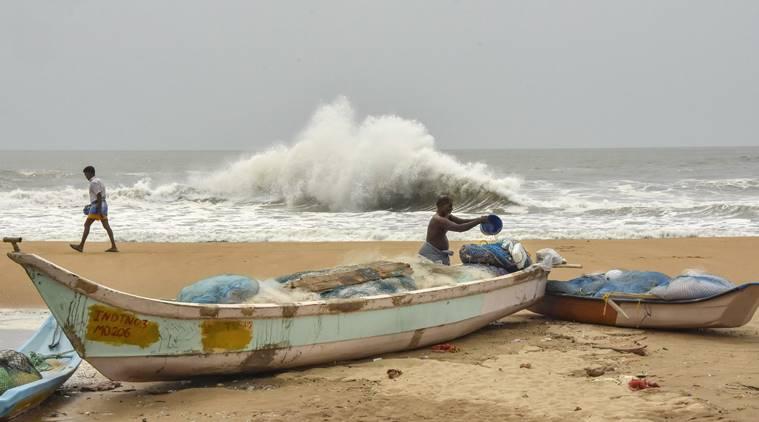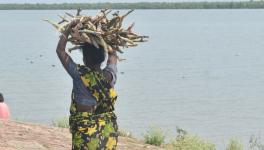With Odisha's Battling COVID-19 and Amphan Cyclone, CM Patnaik’s Demand for Special Focus State Status Needs Consideration

Image Courtesy: Sabrang India
While spearheading the freedom struggle, Mahatma Gandhi was so agonised by the havoc wrought on Odisha due to recurrent natural disasters and famines, that he painfully described it as "a land of tears and sorrows." He wrote several articles depicting the trials and tribulations of people devastated by those calamities. It is tragic, that on the 150th birth anniversary of Gandhiji, humanity is caught within the whirlpool that is the COVID-19 pandemic while Odisha and West Bengal are facing dual disasters – one caused by the novel coronavirus wrecking havoc on health, human and economic security, the other by nature, in the form of the Amphan cyclone. Possibly, Odisha and West Bengal have fallen prey to dual disasters for the first time.
While cases of COVID-19 in Odisha and Bengal are rising because of the arrival of migrants from different parts of the country, the natural disaster, inflicted on people and their Governments, have compounded their problems.
Zero human casualty set as the goal
Chief Minister Naveen Patnaik's Government in Odisha, while arduously battling against the COVID-19 pandemic in the face of rising cases, had set itself the challenging goal that no human lives should be lost on account of the Amphan cyclone. As a goal, the zero-human casualty was indeed tough, given the fact that the pandemic had to be fought with the ruthless practice of social distancing, isolating oneself from the large gatherings and following other non-pharmaceutical measures involving washing hands and drastically cutting down the proximity among humans.
As a result, the worst-affected people from the cyclone-ravaged districts of Odisha – Kendrapara, Jagatsinghpur, Balasore, and Bhadrak – were not willing to come to the shelter homes due to the fear that they would not be able to follow social distancing norms. It must have been a huge challenge for the administration to persuade people to come to the shelter homes to save their lives from both the disasters. In the face of such insurmountable difficulties, 1.5 lakh people were shifted to safer places. It was indeed a great accomplishment that a huge segment of affected and vulnerable population was moved at such a pace by the Odisha administration, which has already been under severe strain due to fifty days of the lockdown to weaken the transmission of the highly infectious SARS-CoV-2.
The high benchmark of excellence in managing disasters by Odisha Government under the leadership of Shri Patnaik since 2000, has saved precious human lives from successive natural calamities.
Odisha deserves praise for battling COVID-19 and the cyclone
The magnitude of havoc that Amphan caused after its land fall near Digha is scary. People from Odisha’s worst-affected districts must have lost standing crops over vast swathes of agricultural land. It would aggravate the food security problem for the suffering people and imperil the agricultural economy of the state. The loss of thousands of trees has also robbed the state of its green cover in the affected districts. Electrical poles have been uprooted and telecommunication has been disrupted. The restoration of electricity and telecommunications in the concerned districts needs to be done on a priority basis. Based on the government’s past record, people will get access to these facilities soon. The state requires underground cables for the transmission of electricity and the huge amount of funds required for this purpose has to be organised with active support of the Union Government. It has been reported that a child has lost her life and another person died on account of the cyclone. In West Bengal, where the cyclone hit land, it has been reported that at least 12 people lost their lives.
It is indeed painful to lose precious human lives during natural disasters. The fewer loss of lives from the worst-affected districts of Odisha proves that a large-scale loss of human lives has been averted because of exemplary preparedness by the government despite engaging its resources in the continuing combat against the COVID-19 pandemic.
Special Focus Status for eastern states facing recurrent cyclones
On September 25, 1937, Mahatma Gandhi authored an article titled “Havoc in Orissa” in the Harijan. It was based on the devastation caused in the then British province due to flood and famine. He observed: “Floods, famines and pestilences have become part of the natural life of India.” He poignantly added, “.... in India, where poverty reaches the point of starvation, the effects of floods and famines are not only not overcome but are felt with double force, and pestilences are ever with us through the same cause. But the gravest defect of India’s pauperism is that we have come to regard these visitations with resignation which is none the less brutal because it is unconscious.”
The havoc in Odisha continues owing to recurrent cyclones. In fact, year on year, the state has been badly ravaged by cyclones and other natural disasters. In the first week of May 2019, Cyclone Fani, which was equal in magnitude to the super cyclone that hit the state in 1999, caused widespread devastation. Forty four people lost their lives despite all the precautions taken to ensure zero human casualties. Such a low number of casualties can be attributed to the effective governance of the Naveen Patnaik Government, which shifted 1.2 million people to safety just 24 hours prior to the landfall of the cyclone. On May 3, 2019, the prestigious New York Times published an article titled, "How do You Save a Million People from a Cyclone? Ask a poor State in India". The essence of the article was the message of disaster management offered by Odisha to the rest of the world.
Lancet, the globally acclaimed British medical journal wrote an editorial on April 25, 2020 titled "India under COVID-19 lockdown", specifically highlighting Odisha along with Kerala and Maharashtra. It flagged the vital measures undertaken by these states to fight the danger posed by COVID-19 to health, human and economic security. The fact that the editorial referred to Odisha spoke volumes of measures it has undertaken to defeat the COVID-19 peril. “Odisha’s exposure to previous natural disasters meant crisis precautions were already in place and have been repurposed," it said, flagging the preparedness of the state in managing natural disasters and ensuring low human casualties.
It is worthwhile to recall that on February 28, 2020, while speaking at the Eastern Zonal Council Meeting held in Bhubaneswar, Odisha CM Naveen Patnaik demanded that states of eastern India should be accorded the status of Special Focus State on account of recurrent and increasing natural disasters confronted by them. Such a demand is just, valid and appropriate.
While addressing the fifth meeting of the Governing Council of the NITI Aayog chaired by Prime Minister Narendra Modi in June 2019, Patnaik had demanded ‘Special Focus State’ status again. He did so without diluting the demand for Special category status for Odisha, taking into account the special needs of the State, particularly the extreme suffering of its people due to several natural disasters.
He also took up the cause of other states and said, “As an interim measure, states hit by major natural calamities may be declared as Special Focus States and granted benefits of Special Category Status for a specific period.” The reiteration of the same demand in the Eastern Zonal Meeting in Bhubaneswar has assumed significance in the context of rising crises caused by frequent natural calamities which have become a new normal due to climate change and global warming, a phenomenon described as more dangerous than thermo-nuclear weapons by former US Secretary of State John Kerry. Now that Amphan has caused havoc in West Bengal and the state has suffered a loss of at least Rs one lakh crore and the State of Odisha has been badly ravaged, the fulfillment of the demand for Special Focus State Status for Eastern States has become a categorical imperative.
It is instructive to note that the fourteenth Finance Commission, in its report, had observed: “There can be no dispute that the primary responsibility for providing relief to people affected by natural calamities is that of State Governments. Nor can there be any dispute that natural calamities, apart from causing loss of life and livelihoods, leave behind a trail of destruction of public assets and private property that require urgent and expeditious restoration, all of which cast a heavy financial burden on the State Government concerned.” The Commission then stated, “We, therefore, recommend that all States contribute 10 per cent to the State Disaster Response Fund during our award period, with the remaining 90% coming from the Union Government.”
If interpreted liberally, the spirit of the Finance Commission recommendations would mean an approach compatible with the Special Focus Status which CM Patnaik has been consistently upholding.
In his first interview after Cyclone Fani cyclone hit the state, Patnaik had said: “Special category status is the need of the hour due to the massive loss to infrastructure which may stall growth of the State. In fact this is one of the main demands before the Union Government. Odisha faces natural calamities almost every year. The assistance we get from the Centre is mostly for temporary restoration of infrastructure. We have to spend a lot from State’s own funds to work for the long term”. A lack of response from the Union Government to such a pressing demand from the state does not augur well for the cause of cooperative federalism.
In spite of the high acclaim received by the Odisha Government at the national and global level for setting a bench mark of governance in managing disasters, the Special Focus State status demanded by Odisha is yet to be considered seriously by the Union Government.
In such a grave situation, where a combined catastrophe caused by the COVID-19 pandemic and the Amphan cyclone is tearing normal life asunder, Patnaik’s demand for special status for Odisha and other eastern states deserves to be accepted by the Union Government.
The writer served as Officer on Special Duty and Press Secretary to Former President of India, late K.R. Narayanan. The views are personal.
Get the latest reports & analysis with people's perspective on Protests, movements & deep analytical videos, discussions of the current affairs in your Telegram app. Subscribe to NewsClick's Telegram channel & get Real-Time updates on stories, as they get published on our website.
























